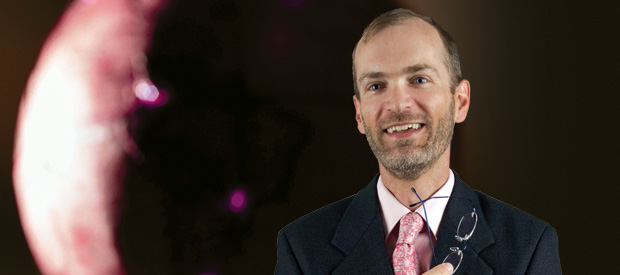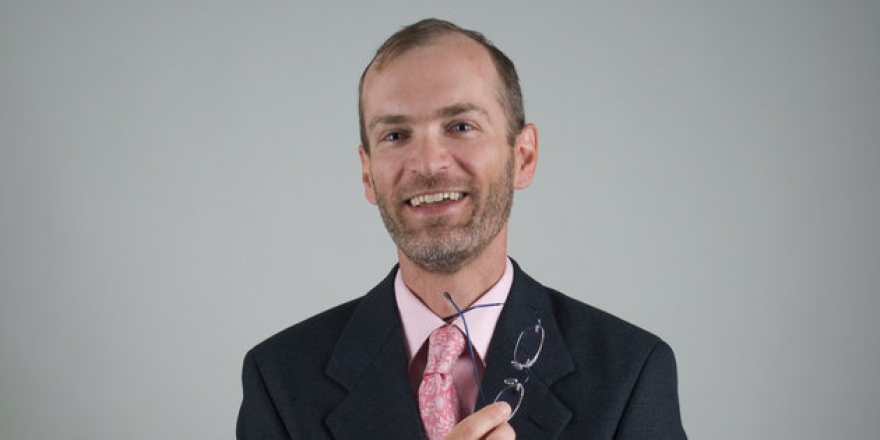Communication by Numbers
James Prieger thinks economics for the growing telecommunications industry.
As the global economic crisis erupted last year, James Prieger witnessed firsthand the continued growth of one of the few industries to defy the downturn: telecommunications. The School of Public Policy professor, who was working in Washington, D.C., as a senior economist for the Federal Communications Commission (FCC), will remember 2008 as the year when mobile devices became commonplace tools for accessing the Internet.

This change alone is rife with implications, and is likely to raise a number of legal issues about which the law is so far unclear. “A truly mobile system might take another telecommunications act in Congress. The Telecommunications Act of 1996 was written for a world that is more and more outdated,” explains Prieger, who was based in the Office of Strategic Planning and Policy Analysis. He cites wireless innovations as examples, saying, “people think of broadband as needing a wire, but mobile broadband is already here, and it’s just around the corner that it can be practically used at very high speeds.”
Prieger put his professorship at Pepperdine on hold for the 12 months of the 2008–2009 academic year under a federal program designed to bring academics to government agencies for short periods of time without requiring them to relinquish their university positions. With his wife and two children, he road-tripped from California to the nation’s capital. There he advised the FCC about telecommunications mergers, regulating industry competition, federal telecommunications initiatives, data privacy, and economic penalty review. “I provided considerations of what economic theory would suggest to the issue at hand,” he says.
He helped guide the organization through a number of major telecommunications mergers, including the merger of giants Verizon and Alltel. To an economist looking at the bigger picture, the merger represented not just immediate dollars but the long-term impact for consumers.
“The part I worked on had me examining what level of competition would remain in the industry after the merger,” he explains. “Verizon is huge and Alltel has a large market in certain parts of the country. So the fear at the FCC is that, by merging and eliminating that much competition, prices will go up. The issue that gets bigger with each passing merger is when to stop. We’re now down to four wireless carriers with national footprints. Would the FCC approve a 4-3 merger at this point? But the urge to merge will always be there, and that’s something the FCC will have to wrestle with.”
The Economic Stimulus Act of 2008 gave Prieger the opportunity to work at the front end of a government telecommunications initiative to close the digital divide with approximately $7.2 billion in funding for broadband adoption and access to industry and nonprofit organizations. He provided economic advice to the organization entrusted with administering the program. “I can’t say exactly what influence we had yet, but it was interesting for me because I wasn’t dealing with old policy, but looking at and helping to shape new principles.”
Prieger returns to Pepperdine with a wealth of practical knowledge, thanks in large part to the major upheavals experienced by the telecommunications industry while he was in D.C. Not only did the economy tank and the mobile Web make a sudden charge to the front of the Internet battle line, but in the middle of the academic year the government administration changed hands following the election of president Barack Obama. He refers to this historic moment as a highlight of his time at the FCC. “It was thrilling to be there during a time of transition.”
It was also a learning opportunity. One of the challenges for an outside economist working in the government agency under any given administration is remembering that nonpartisan advice and expertise is all they can give; ultimately, decisions are made by the political appointees who run the FCC. “We have to find a common language, but if the economics is pulling in different directions from the politics, then it’s obvious which will win,” he admits.
“Government work was and is very different from academic work, but that’s part of the reason I wanted to go,” he continues, reflecting on his change of pace and professional responsibility. “They take seriously the notion that protecting the consumer is the job given to them by Congress, and the economic staff really believe in that mission.”
Working directly in government and helping to shape policy was an experience he is excited to bring back to the classroom this fall. “I think policy students are always a little suspicious of professors who theorize without practical knowledge,” laughs Prieger. “But they, in particular, are just very interested in how government really works.”
